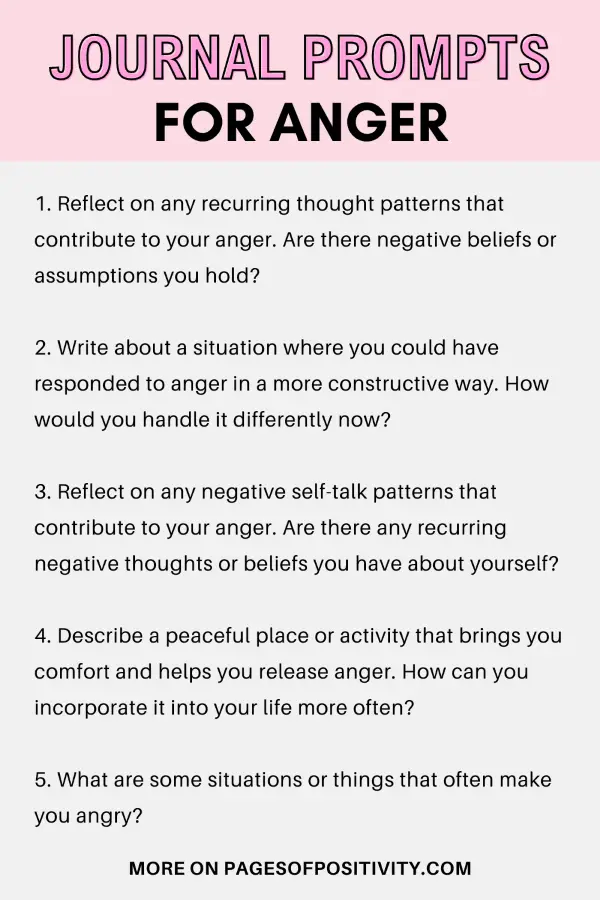A list of 75 shadow work prompts for anger
Today, we’ll be talking about journal prompts for anger.
We all experience this intense emotion from time to time, and it can be quite overwhelming.
I’m here to share some amazing writing prompts that will help you navigate your anger, understand its roots, and find healthy ways to express and manage it.
So grab your favorite notebook and let’s embark on this transformative journey together!


This post may contain affiliate links. That is, if you click on a link and buy something I recommend, I will receive a small compensation at no additional cost to you.
75 good prompts for your anger journaling
25 journal prompts for anger management
- What are some situations or things that often make you angry?
- Think about a recent experience when you felt angry. What happened, and how did you react?
- How does anger usually show up in your body? Are there physical sensations or signs that let you know you’re getting angry?
- Explore any underlying emotions that might be fueling your anger. Is there fear, sadness, or frustration beneath the surface?
- Describe a healthy and positive way you can express your anger without hurting yourself or others.
- Write about a time when you effectively managed your anger. What strategies did you use, and how did they make you feel?
- List three positive aspects or benefits that anger can bring to your life if you handle it in a constructive way.
- What are some negative consequences you’ve experienced because of uncontrolled anger? How would managing your anger be beneficial to you?
- Reflect on any recurring thought patterns that contribute to your anger. Are there negative beliefs or assumptions you hold?
- Write a letter to someone who has made you angry or frustrated. Express your feelings honestly, but keep the letter to yourself.
You might also like: Journal prompts for jealousy to help you cope
- How does anger affect your relationships? Think about any patterns or dynamics you’ve noticed.
- Think of a role model or someone you admire who handles anger well. What qualities do they possess, and how can you learn from them?
- Write about a situation where you could have responded to anger in a more constructive way. How would you handle it differently now?
- List five positive ways or activities you can engage in when you feel anger rising.
- How do cultural or societal influences shape your view and expression of anger? Explore any expectations or norms related to anger in your culture.
- Write about a time when someone expressed anger toward you. How did it make you feel, and how did you react?
- Reflect on any childhood experiences that may have influenced how you deal with anger. How did your family or environment handle anger?
- Explore any fears or concerns you have about expressing your anger in a healthy and assertive manner.
- Describe a situation where you successfully channeled your anger into a positive outcome or productive action.
- Write a gratitude list focusing on the things that help you calm down and find peace when you’re angry.
- Reflect on any negative self-talk patterns that contribute to your anger. Are there any recurring negative thoughts or beliefs you have about yourself?
- Imagine a future version of yourself who has mastered anger management. How does this version of you behave and respond to anger?
- Describe a peaceful place or activity that brings you comfort and helps you release anger. How can you incorporate it into your life more often?
- Write a letter of forgiveness to yourself for any mistakes or regrets related to your anger. Practice self-compassion.
- Reflect on the progress you’ve made in managing your anger. Celebrate the positive steps you’ve taken and acknowledge your personal growth.
You might also like: The best new month journal prompts to help you start fresh

25 journal prompts for resentment
- Think about a specific situation or person that you still feel angry or upset about. Describe what happened and how it made you feel.
- What are the main emotions underneath your anger? Is it because you felt hurt, betrayed, or treated unfairly? Explore these emotions in detail.
- Write a letter to the person you have negative feelings towards. Express your emotions honestly, but keep the letter for yourself as a way to process your thoughts and feelings.
- How has holding onto anger affected your well-being and relationships? Reflect on the negative impact it has had on your life.
- Look for any patterns or similarities in the situations that have caused your anger. Are there common triggers that consistently lead to your resentment?
- Describe a situation where you were able to let go of anger and find forgiveness. How did it feel, and what steps did you take to reach that point?
- Identify any unrealistic expectations you might have had that contributed to your resentment. How can you adjust these expectations to foster healthier relationships?
- Reflect on any personal boundaries that may have been crossed, leading to your resentment. Do you need to establish or communicate clearer boundaries?
- Write about a time when you held onto anger for longer than necessary. What prevented you from letting go, and what lessons did you learn from that experience?
- Consider any possible misunderstandings or miscommunications that may have played a part in your resentment. Is there an opportunity for clarification or open dialogue?
- List three positive aspects or lessons you can learn from the experience that caused your resentment.
- Reflect on the role of forgiveness in releasing anger and resentment. What does forgiveness mean to you, and how can you work towards it?
- Create a list of self-affirmations that promote self-compassion and healing as you deal with your anger.
- Explore any self-limiting beliefs or negative thought patterns associated with your anger. How can you challenge and change these beliefs?
- Reflect on how holding onto anger has hindered your personal growth and happiness. How has it prevented you from moving forward and finding inner peace?
You might also like: Incredibly good spiritual journal prompts for some self-reflection
- Think about a time when you tried to understand and feel empathy for someone you were angry with. How did this change in perspective affect your emotions?
- Write about a situation where someone forgave you for something you did wrong. How did their forgiveness affect your relationship, and how did you feel about any guilt or anger you had?
- Reflect on the power dynamics in the situation that caused your anger. Are there any imbalances of power that need to be addressed or changed?
- Explore any past experiences or traumas that might have contributed to why you hold onto anger. How can you find healing and support in those areas?
- Make a list of things you’re grateful for that have nothing to do with the situation or person you’re angry with.
- Describe a future where you let go of anger completely. How would your relationships, well-being, and overall happiness be different?
- Reflect on how your anger can be an opportunity for growth. How can you use this experience to learn more about yourself and grow as a person?
- Write a letter of forgiveness to yourself for any mistakes or regrets connected to your anger. Be kind to yourself and forgive yourself.
- Explore any cultural or societal influences that might affect how you see and handle anger. Are there any expectations or rules from society that affect how you deal with these emotions?
- Reflect on the progress you’ve made in letting go of your anger. Celebrate the steps you’ve taken towards healing and forgiveness.
You might also like: Use these journal prompts for love for better relationships
25 journal prompts about repressed anger
- Think about situations or events from your past that made you really mad, but you didn’t show it. Write about them and how they made you feel at the time.
- What are some signs that show you might be keeping your anger inside? Think about how your body feels, your emotions, or how you act when you’re holding back anger.
- Talk about how the way people around you and society in general think about anger has influenced the way you deal with it. Are there any rules or expectations that have made you hide your anger?
- Describe a time recently when you were angry but didn’t show it. Why did you choose to hide your feelings in that moment?
- What are you afraid might happen if you let yourself get really angry? Think about the things that worry you when it comes to expressing your anger fully.
- Write a letter to yourself when you were younger, understanding the times when you hid your anger or when people didn’t take it seriously. Be kind, and let your younger self know that it’s okay to be angry.
- Think about how keeping your anger inside can affect your mental, emotional, and physical health. How has it made your life harder?
- Describe a way to let your anger out in a safe and healthy manner without hurting yourself or others. How can you make this a part of your life going forward?
- Talk about any situations, people, or things that make you angry, but you don’t express it. Are there any patterns or things that happen again and again?
- Think about any ideas or messages you’ve learned that make you keep your anger inside. How can you change these ideas and think differently?
- Are there any other feelings like sadness, frustration, or resentment that might be connected to your hidden anger? Think about how these emotions are linked.
- Describe a time when you were able to let out your anger in a good way. How did it feel, and what did you do to make it happen?
- Write about someone you trust and feel comfortable with when it comes to expressing your anger. How can you create a safe space to talk about your feelings?
- Think about how your family and your experiences when you were young have affected the way you handle anger. How did your family deal with anger, and how does that impact you now?
- Make a list of positive statements that remind you that it’s okay to feel and show anger. Tell yourself that anger is a normal and important emotion.
You might also like: The best forgiveness journal prompts to help you move on this year
- Describe something you can do for self-care or an activity that helps you connect with and release your hidden anger. How can you make it a regular part of your routine?
- Think about what lessons or insights your hidden anger might have for you. What can you learn from this emotion, and how can it help you grow as a person?
- Reflect on any physical activities or ways to move your body that can help you release hidden anger. Consider things like exercise, dancing, or martial arts.
- Write a letter to your anger, speaking directly to it and allowing yourself to say what you really feel. Use this as a chance to let out any built-up emotions.
- Explore if there are any times when you blame yourself or feel guilty about your hidden anger. How can you practice being kind to yourself and let go of those burdens?
- Think about a time when you saw someone express their anger in a good and confident way. How did it make you feel, and what can you learn from that experience?
- Consider the positive things that can come from recognizing and showing your hidden anger. How can it help you grow as a person, improve your relationships, and make you feel better overall?
- Reflect on the negative effects of holding back your anger. How has it affected your relationships, how you feel about yourself, and your overall well-being?
- Write about the beliefs or fears that make you hide your anger. What do you worry might happen if you let your anger out completely?
- Explore different ways you can express your anger in a healthy and constructive manner. Think about safe activities or outlets that allow you to release your anger in a positive way.

FAQ: How does journaling help with anger management?
Journaling for anger management is a powerful and essential tool that allows us to delve deep into our emotions, gain clarity, and find effective ways to manage and release anger.
When we put pen to paper, we create a safe and judgment-free space where we can freely express ourselves without fear of consequences or hurting others.
When you start incorporating journaling into your anger management practice, you can experience a multitude of wonderful benefits. Let’s explore some of the positive changes that may occur:
Increased self-awareness
Using journaling prompts for anger allows you to become more in tune with your emotions, thoughts, and triggers. As you consistently write about your anger, you’ll start noticing patterns and identifying specific triggers.
You’ll gain a deeper understanding of the root causes of your anger. This self-awareness is a crucial step toward effective anger management.
Emotional regulation
When you use journaling to process emotions, you’ll learn to recognize and regulate your emotions better. As you pour out your anger onto the pages, you can reflect on the intensity and impact of your emotions.
This practice helps you develop the ability to step back, assess the situation objectively, and respond in a more controlled and balanced manner.
Improved problem-solving skills
Journaling empowers you to explore potential solutions and strategies for managing anger. By writing about your anger-provoking situations, you can brainstorm alternative responses and analyze different perspectives.
You’ll learn to devise practical approaches to handling similar scenarios in the future. This process nurtures your problem-solving skills and gives you effective tools for anger management.
Stress reduction and emotional release
As you write, you give yourself permission to express your anger fully, without judgment or consequences. This process allows you to unload the emotional weight, reduce stress, and improve your mental health.
Enhanced communication
Journaling allows you to refine your communication skills, both with yourself and others.
Through writing, you can practice expressing your anger constructively and explore alternative ways of communicating your needs and emotions.
This enhanced communication can lead to healthier relationships and more effective conflict resolution.
Personal growth and transformation
Regular journaling for anger management nurtures personal growth and transformation.
As you delve into your emotions, explore your triggers, and develop healthier coping mechanisms, you embark on a journey of self-discovery and self-improvement.
Journaling becomes a transformative tool that empowers you to evolve and flourish on an emotional and personal level.
Did you find any new journal prompts for anger that might benefit you?

I consider myself an expert when it comes to positive affirmations, journaling, and inspirational quotes. My blog is all about spreading good vibes and helping you feel awesome! I’ve got loads of cool stuff for you to explore, like uplifting affirmations that can boost your confidence, fun journal prompts to spark your creativity, and inspiring quotes to motivate you every day. Let’s embark on this amazing journey together as we discover more about ourselves, uncover our hidden strengths, and create a life that’s full of happiness and success.






